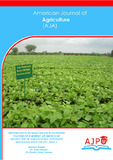The Influence of Selected Socio-Economic Factors on Farmers’ Awareness of Devolution of Agricultural Extension Services In Kitui County, Kenya

View/
Date
2021-06Author
Kyambo, O.
Kilungo, J.
Amwata, Dorothy A.
Metadata
Show full item recordAbstract
Purpose: Agriculture is the main stay and driver of Kenyan rural economy. Despites the critical role of agriculture in Kenya, poor access to extension support services persist. This study sought to assess the influence of selected socio-economic factors on farmers’ awareness of devolution of agricultural extension services in Kitui County. Methodology: The study used an ex post facto descriptive survey design. A total sample of 99 farmers drawn from the population of 222,781 households in 40 wards (GOK – Economic Survey 2019.) was selected from Kitui County using a stratified random sampling approach. Questionnaires were administered to the sampled farmers. Data analysis was carried out using descriptive, inferential statistics (binary logistic regression). Findings: This study established that older farmers were aware about devolution of agricultural extension services. This study also found that male farmers were more aware about devolution of agricultural extension services as compared to their female counterparts. Moreover, educated farmers were more aware about devolution of agricultural extension services as compared to their less educated counterparts. Family heads from wealthier households (with greater income) were more aware about devolution of agricultural extension services as compared to their counterparts from low income households. The respondents that had larger sizes of land were more likely to be more aware of about devolution of agricultural extension services as compared to household heads with smaller sizes of land. Unique Contribution to Practice and Policy: This study recommends that more campaigns and sensitization should be made in the vast Kitui County to create awareness about the devolution of agricultural extension services and encourage more women smallholder farmers to take advantage of this service especially through organised groups. Key campaigns should especially be implemented through women groups, since women farmers had the least awareness of the devolution of agricultural extension services.
URI
https://ajpojournals.org/journals/index.php/AJA/article/view/731http://repository.seku.ac.ke/handle/123456789/6283
http://hdl.handle.net/123456789/4721
